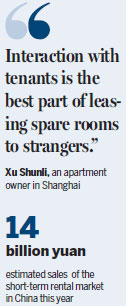Homeowners in China now have more choices when renting out their idle properties as short-term accommodation service providers online are differentiating their positioning and offerings.
This may help homeowners to increase income with less efforts. Also, homeowners are likely to make use of multiple accommodation services online related to tourism and hospitality industries.
For Zhang Huawei, a 43-year-old owner of two apartments in Shanghai, renting out his properties through Tujia, an online platform that targets business travelers, feels like "bliss".
"In the past, leasing out my properties (on a medium- to long-term basis) was a nuisance. Tenants would call you at midnight demanding urgent maintenance like plumbing or lighting. Some tenants wouldn't clean the flats regularly. Some had quite bad habits. I had to spend thousands of yuan on pest control when he moved out.
"But rental is an important part of my income, so I can't just keep the flats empty. When my nephew told me about short-term rental programs, I joined one immediately. I can sleep well now, without worrying about my apartment conditions and maintenance calls at unearthly hours," he said.

His flats are among the listings on a short-term rental platform. Zhang just needs to ensure the properties are well maintained. Toward that end, he pays a maintenance fee to the platform, in addition to the commission on each transaction with a short-term tenant. Typically, such a commission is about half of the short-term rental.
But overall income through short-term hires tends to be higher than the monthly rents, as long as such bookings are for more than 12 days in a month.
Zhang earns about 500 yuan ($72.57) per night from his one-bedroom apartment in Huangpu district. The two-bedroom apartment in Pudong district goes for about 600 yuan per night.
In the past, the one-bedroom apartment used to generate about 3,000 yuan per month, and the larger one about 4,000 yuan per month.
For Xu Shunli, owner of an apartment close to Shanghai Disney Resort, leasing out two rooms of her villa on a short-term basis through Xiaozhu generates much more than an income.
A freelance copywriter, Xu loves taking care of her tenants. This trait is what makes Xiaozhu stand out. It is a platform that focuses on providing tenants with "local experience".
"I never feel like a landlord - I feel more like an innkeeper. I provide food, and chat with tenants who are mainly young couples. Interaction with tenants is the best part of leasing spare rooms to strangers. It is more than making money. I do feel like it is a second occupation for me," Xu said.
Sometimes, when tenants need services over and above accommodation, such as pick-up from the airport, or a tour guide, Xu gives them useful advice or introduces them to a travel agency.
It is not just homeowners and tenants who are benefiting from online services. Business opportunities are arising for the entire tourism supply chain.
For instance, Zhang owes his peaceful nights now to the professional maintenance team that the digital platform dispatches for his flat's upkeep and laundry requirements.
Other operators offers add-on services like car rental, tour guide, ticket-booking, restaurant reservation.
According to research of CTCNN, a Beijing-based tourism consultancy, the short-term rental market in China expanded fast since it emerged in 2012. The business segment clocked 21 million room nights in 2016 with average customer transaction generating 334 yuan per room night.
The market generated 8.9 billion yuan in 2016 sales, and is expected to grow to 14 billion yuan this year.
"It's still a small amount compared to conventional hospitality services such as serviced apartments and hotels. For short-term rental platforms, the key is to scale up the market size," said CTCNN in its research report.
